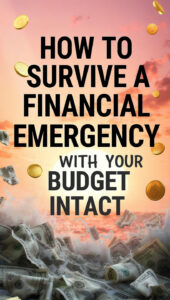Now Reading: HOW TO SURVIVE A FINANCIAL EMERGENCY WITH YOUR BUDGET INTACT 💥
-
01
HOW TO SURVIVE A FINANCIAL EMERGENCY WITH YOUR BUDGET INTACT 💥
HOW TO SURVIVE A FINANCIAL EMERGENCY WITH YOUR BUDGET INTACT 💥
Have you ever felt your heart drop after an unexpected bill hit your account?
A broken boiler in the middle of winter. A surprise medical bill. Or your car refusing to start the one day you really needed it.
When these things happen, it’s more than just a money problem — it’s stress, panic, and sometimes even shame.
But here’s the truth no one tells you:
You can survive a financial emergency without blowing up your budget — and without losing your mind.
Let’s walk through the first steps that will ground you, calm you, and help you take back control.

🧠 1. Breathe First, Act Second
Before you dive into numbers or panic calculations, pause.
Stress can cloud judgment — and the last thing you want is to make hasty financial decisions in a whirlwind of emotion.
Take 3 deep breaths. Remind yourself: You’ve handled hard things before — you’ll handle this too.
Then get clear:
-
What exactly happened?
-
How much money is needed?
-
Is this a one-time emergency or something that might repeat?
Awareness is your first weapon.
💼 2. Tap Into Your Emergency Fund (If You Have One)
If you’ve been setting money aside for a “rainy day,” this is what you saved it for.
No guilt. No hesitation. Use it.
💡 Reminder for next time: Aim to keep at least 1 month’s worth of essential expenses in a separate emergency-only savings account.
Even $300–$500 can be a lifesaver during a crisis.
📋 3. Re-Evaluate Your Budget — FAST
Open your current budget and re-prioritize like a boss.
Ask yourself:
-
What can be paused or canceled for now? (Streaming subscriptions, takeouts, shopping splurges)
-
Can you temporarily reduce any fixed costs? (Call your internet or phone provider and ask for a downgrade or discount)
This is not about deprivation, it’s about shifting focus to what matters right now.
You can always go back to your regular spending later.
🤝 4. Ask for Help — Without Shame
This part feels hard, especially for strong, independent women who are used to “handling it all.”
But hear this:
You’re not weak for needing help. You’re human.
Whether it’s asking a close friend for a short-term loan, calling your landlord to explain the situation, or reaching out to a local community group — support is out there, but you have to be brave enough to ask.
✨ Bonus Tip: Many cities in the US, UK, and Canada offer emergency grants or hardship relief programs. It’s worth researching them.
🧾 5. Negotiate with Confidence
If your emergency involves bills — medical, rent, or utilities — don’t just accept them blindly.
Call. Email. Ask.
Sometimes you can:
-
Get late fees waived
-
Set up a payment plan
-
Qualify for temporary hardship programs
You’d be amazed how often companies are willing to work with you if you just explain the situation.
Don’t suffer in silence — speak up.
💖 YOU’RE STRONGER THAN YOU THINK
Remember, this moment won’t define your financial journey — how you handle it will.
And surviving a financial emergency without letting your budget completely collapse?
That’s the kind of power every woman deserves to feel.
📌 Save this guide — because even if you don’t need it right now, you might later. And someone you love might need it too.
So, you made it through.
The emergency hit hard… but you’re still standing. 💖
Maybe your budget’s bruised. Maybe you had to dip into savings or ask for help. But the worst is over — and now it’s time to heal, rebuild, and come back stronger.
This phase? It’s where the real empowerment begins.
🧹 1. Take Inventory — What Did It Teach You?
Every financial emergency carries a lesson.
Ask yourself:
-
What made me feel the most vulnerable?
-
What part of my budget worked? What failed me?
-
Could I have been more prepared in any way?
This isn’t about blame — it’s about building resilience.
✨ Example: If you realized your emergency fund was too small, now you know your new target. If your rent left you strapped, maybe it’s time to re-evaluate your housing expenses long-term.
🪙 2. Refill Your Emergency Fund — Slowly but Surely
You used it. That’s what it was for.
Now let’s rebuild it intentionally.
Start small:
-
Even $20/week makes a difference
-
Automate your savings so you don’t have to think about it
-
Keep it in a separate account to avoid temptation
Remember: Peace of mind is built in quiet, consistent steps.
💡 Tip: Some banks allow “round-up” savings — where every time you spend, the extra change goes to savings. It’s effortless and adds up faster than you’d think!
📉 3. Adjust Your Budget for Recovery Mode
Recovery means making temporary sacrifices so you can bounce back stronger:
-
Pause fun spending for a month or two (your future self will thank you)
-
Focus on essential-only expenses
-
Direct any extra cash — tax refund, side hustle income, even a gift — toward your fund or debt repayment
You’re not punishing yourself — you’re realigning.
Think of it as financial therapy for your bank account.
🧾 4. Set Up Mini-Sinking Funds (aka Little Lifeboats)
One of the smartest post-emergency moves?
Start creating “mini-buffers” for future surprises.
They’re called sinking funds, and they save your budget from taking another hit next time.
Start with:
-
Car repairs 🚗
-
Home maintenance 🛠️
-
Medical/dental 🩺
-
Gifts & holidays 🎁
Even putting away $10/month for each makes a difference. When life happens (and it will), you’ll be so glad you thought ahead.
🧘♀️ 5. Give Yourself Grace
You’re not behind. You’re not broken. You’re real.
So many women carry guilt after a financial emergency — especially if they had to ask for help or fell behind on bills.
But guess what?
🌟 Financial recovery isn’t about perfection — it’s about progress. And girl, you’re doing beautifully.
Celebrate every small win:
✔ You budgeted again
✔ You didn’t give up
✔ You made a plan
✔ You’re here, reading this, choosing growth
That’s what strong women do. 💖
🔐 Bonus: Create Your “Emergency Shield”
Here’s a simple Emergency Shield System you can build over the next few months:
-
Emergency Fund — Your financial airbag 💵
-
Sinking Funds — For known unknowns
-
Basic Insurance — Health, renter’s, car — don’t skip this
-
A “Break Glass” Plan — A simple checklist of what to do when chaos hits again (people to call, accounts to check, etc.)
This shield doesn’t make you invincible — but it makes you ready.
❤️ Final Words: You Did That.
You handled something most people avoid talking about.
You kept your budget afloat during a storm, and now you’re rebuilding with intention.
And girl — that’s something to be proud of.
📌 Pin this for later. Because the next time life throws you a challenge, you’ll be the calm in the chaos — and you might just help someone else do the same.














